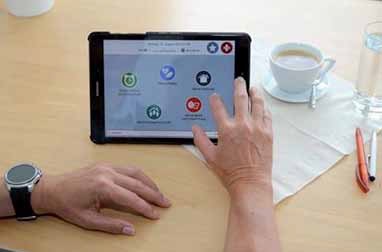ZentrAAL - Living Independently in Your Own Home
Short Description

In recent years, various technological solutions for supporting elderly persons have come onto the market. Most technologies focus on comfort and consequently on functionalities to support people in their everyday life. By taking over simple activities, however, they may cause functional skill losses and increase care needs.
Learn to Use Technologies While Still Healthy
The ZentrAAL project focusses on the development of technology-enabled services in order to prolong independent living by older people by maintaining their functional skills and current health status. Elderly people are supported in managing their everyday life on their own.
In order to reach this long-term goal, ZentrAAL addresses older people who are still healthy and active (with very little or no need for support). The project aims to make AAL technologies accessible to these people by demonstrating the benefits of AAL usage. Consequently, they will be prepared to use these technologies when they need them at a later stage, and make the best use of them according to their needs.
Feel Safe and Fit in Everyday Life with meinZentrAAL
The meinZentrAAL information system developed within the project includes several systems and components already available on the market. The development focused on user-centred design, usability, cost-efficiency, expandability and easy upgrade options.
The meinZentrAAL solution provides functionalities with respect to
- safety,
- fitness,
- community,
- apartment automation,
- appointments and
- entertainment.
The emergency SOS button enables the user to call the Hilfswerk emergency centre day and night. The silent alert is another safety feature. Smart home sensors are installed in the user’s apartment, which can detect critical situations and raise an alert according to individual configurations. The fitness functions contain individual exercises provided as videos with different levels. Additionally, it is possible to record movement and other activities as well as vital parameters automatically or manually. Users have thus the possibility to control their physical activities and realise changes in their vital parameters.
The community functionalities are particularly geared to users and employees of sheltered housing schemes or similar accommodation in order to improve networking and strengthen the community.
The apartment functionalities combine several smart home components such as
- window and door sensors,
- an electronic door guard,
- a stove monitoring system and
- a wireless light switch.
The calendar feature can be used to organise appointments and configure reminders. The entertainment functions were mainly implemented to familiarise the users with the system in a playful manner.
Therefore, the system provides
- games,
- Internet access,
- regional newspapers,
- camera and gallery,
- weather forecasts and,
- if desired, Skype and
- e-mail.
The meinZentrAAL solution can be used at home and outside via a tablet or a smartwatch.
End User Acceptance through Lead User Workshops
In order to ensure good usability and end user acceptance of the developed services, older people have been involved in all the relevant project phases from the beginning. Therefore, so-called lead users were recruited, who were actively involved in the development of the system by participating in workshops. The requirements were gathered in three iterative lead user workshops.
Additionally, two workshops were conducted with employees of sheltered housing schemes operated by Hilfswerk Salzburg. During the system development phase, the lead users were involved in the user interface design. Paper prototypes were used to create and discuss possible interactions.
In May 2016, meinZentrAAL was installed in over sixty households with people living in sheltered housing schemes or similar accommodation in the province of Salzburg. These people will be testing the system for fifteen months.
Weekly "ZentrAAL Café" meetings were organised during the first ten weeks, where users were trained to use the system and had the opportunity to clarify questions. The field trial serves to evaluate the impact, effectiveness and user acceptance of meinZentrAAL using questionnaires and interviews. In addition to the test group, a control group of equal size will be interviewed about quality of life aspects. The field trial will be concluded in July 2017.
Project Partners
Consortium Manager
Salzburg Research
Forschungsgesellschaft m. b. H.
Further Project Partners
- Carinthia University of Applied Sciences
- Hilfswerk Salzburg Gemeinnützige GmbH
- ilogs mobile software GmbH
- Paris Lodron University of Salzburg
- Salzburg AG für Energie, Verkehr und
- Telekommunikation
- Salzburg Wohnbau GmbH
- Vienna University of Economics and Business
Contact Address
Project Coordinator
DIin (FH) Mag.a Cornelia Schneider
E-mail: cornelia.schneider@salzburgresearch.at
